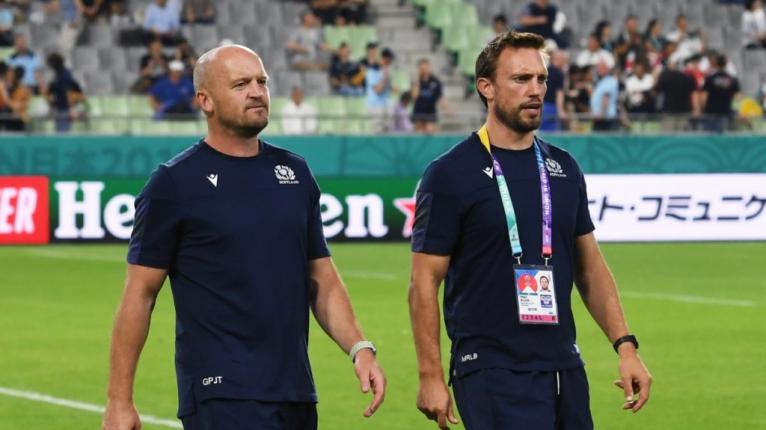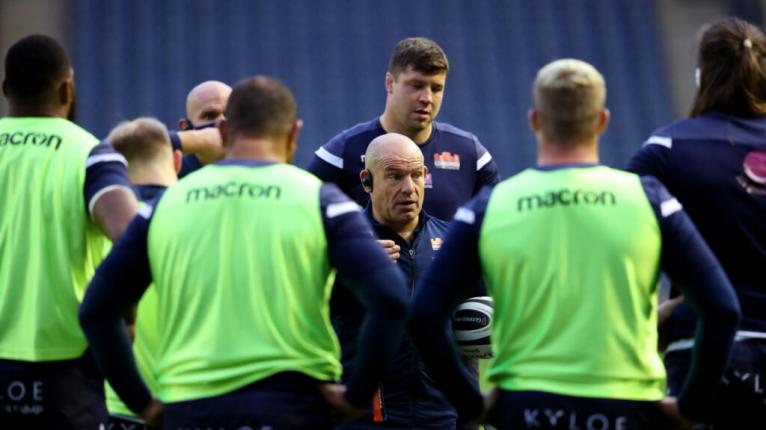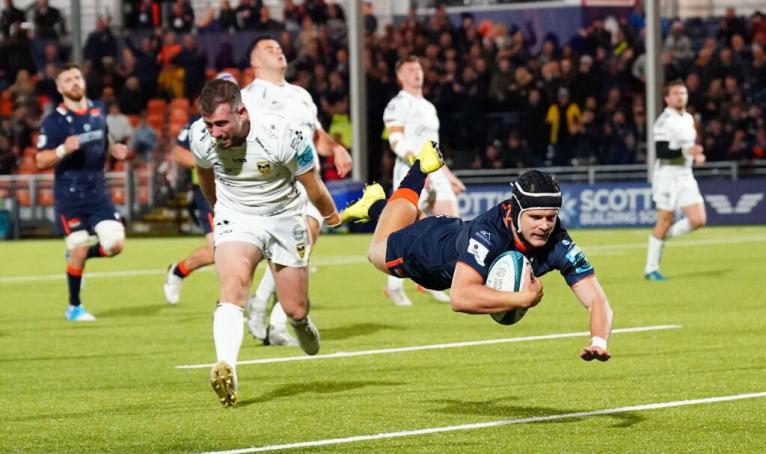July 2021. Mike Blair is sitting before Mark Dodson and Jim Mallinder, two of the most influential men in the Scottish Rugby hierarchy, giving a staunch explanation of why a head coach gig isn’t for him. Three days later, he is back in front of the same executives as they offer him the Edinburgh job.
Blair, at the time Gregor Townsend’s skills coach, stood in for his old half-back partner when Townsend was in South Africa with the British and Irish Lions. He took charge of Scotland’s doomed ‘tour’ against England A, Georgia and Romania when covid swept the Scottish camp, no actual touring took place and the whole programme was scrapped. He found the experience draining, a brief taste of the relentless demands of the top job. It reinforced his belief he wasn’t yet prepared to take on such onerous responsibility.
“I had a chat with [chief executive] Mark Dodson and [director of rugby] Jim Mallinder a week after the Scotland stuff, and they asked what I thought about being a head coach,” Blair tells RugbyPass+.
“I was like, ‘ach, maybe in four or five years’ time, I found it really full-on, I don’t know if I’m ready for that or enough of an adult to deal with all these different bits’.”
Spool through 72 hours and Blair is hacking around a North Berwick golf course when his phone vibrates. Richard Cockerill, Edinburgh’s truculent head coach, has gone. Blair plays another few holes. The phone starts going berserk in his pocket. His swing deserts him as he realises what looms.
I went into the meeting thinking along the lines of ‘thanks but no thanks’ if they were going to offer me the job because I was loving my life at that time.
“I had two missed calls from a number I didn’t recognise, then a text saying, ‘it’s Mark Dodson here, can you phone me?’ I didn’t really think about the connection, but as soon as I called him, arranged to meet, and hung up, I was like, ‘ah’. Bearing in mind three days earlier I’d told them being a head coach didn’t fill me with joy…
“I went into the meeting thinking along the lines of ‘thanks but no thanks’ if they were going to offer me the job because I was loving my life at that time. I was getting more and more stuff with Gregor, more seniority, more trust. My work-life balance was great.
“But within five minutes of the discussion, I was getting excited about what I could do at Edinburgh. I had five days to let them know and I don’t think I slept a wink that week, mind all over the place.”
In the end, fraught though he was with doubt, Blair backed himself. At 40, he became one of the youngest head coaches in any of rugby’s top leagues.
Blair was pitched in to reeling Edinburgh, the club where he was captain and spent a decade playing, two months before their URC opener. The place was foundering. Fans turned off by the turgid, formulaic rugby on show. Players who had been in open revolt against Cockerill and his autocracy. Some felt bullied. Many had their love of the game leeched away.

“It was a really tight-knit group,” Blair says. “I’ll let you speculate on how they became so close, but it was obvious they looked after each other.
“The main bit I wanted to bring about was enjoyment, smiles on faces – enjoying the job you’re doing, but also enjoying the fact we’re going to try and make you better every day.
“We used a fair bit of budget on socials to lift spirits. We went down to Fox Lake, we did paintballing, lots of different things. But we wanted to stress the enjoyment of getting better.
“I tried to make everything fast-moving, tried to give different stimuli, we tried a couple of different attack shapes, not because we were necessarily going to do them in games, but because I wanted to challenge guys to think, ‘right we’re doing something different here, this is exciting, I need to think about what I’m doing’. I wanted to challenge and enthuse them in that way.
“I deliver messages in different ways than perhaps they were used to – word associations, pictures, fill in the blanks, different games. I remember I apologised to the guys after my first meeting because I’d gone on far too long and some of the players laughed. I spoke to Chris Dean afterwards and asked why boys were laughing. He said, ‘Mike, the meeting was 25 minutes; our usual meeting would be an hour and a half’.”
Here was the anxiety of a coach experiencing so many things for the first time but clearly getting an awful lot right. He offers a blow-by-blow account of Edinburgh’s agonising URC quarter-final in Cape Town, and their even more agonising Challenge Cup quarter-final at the DAM. He unpacks his first six years of coaching under Townsend and Dave Rennie – his two greatest influencers – before apologising for excessive “rabbiting”. He describes in minute detail how he grappled with the ugly task of telling players they were surplus to requirements. He recounts how, barely in the door, he had to decide who would be offered new deals while trying to recruit an attack coach and a forwards specialist and somehow ready the group for the new season. In those early days, the job swallowed him up and his wife, Viv, and two children, watched him vanish.
While I was on holiday, I had my phone Velcro-ed to my ear. I was hopeless. It came as a shock, how all-consuming it is.
“I wasn’t good at home,” he says. “Once I accepted the job, we had a week in Isla booked in already and I said, ‘I need to do this because it’s my holiday, otherwise I’m going straight from one job to the other’.
“While I was away, I had my phone Velcro-ed to my ear. Even when I was out, I wasn’t out. The first day back was my welcome presentation so I was doing all of that. I was hopeless. It came as a bit of a shock, how all-consuming it is.”
But Blair is a free-thinker and a creative and looks every inch a brilliant hire. In his first season, he had the team playing some marvellous stuff en route to the URC play-offs. He had a huge hand in Blair Kinghorn’s move from full-back to fly-half and the riches it yielded. He transformed Edinburgh, yanking them away from the pallor and rancour of Cockerill’s last throes while retaining the snarl and bite that underpinned the happier part of the Englishman’s reign.
“I thought there were some easy wins because we were moving to the [newly erected] DAM, we had a fast track, we had exciting players,” he says.
“There was a negativity around the kicking game that Edinburgh used. The crowds hadn’t been great. I felt we had players to play a game to entertain the crowd, to bring them as part of what we’re trying to do. The first few games, there was an element of, let’s just give it a go, play a brand we want to play, understand we need to kick at times but kick in different ways, to create turnover ball so we get transition attack.
“When we won away at Saracens, it was wet and windy and you can’t throw the ball around there. We had some really smart play where we dummied a box kick, shifted the ball and kicked from the wide channels to put pressure on that way.
“I want us to be constantly thinking and innovating and not falling into what all teams do. I am aware you can fall down in that, but I believe having a positive outset, trying to win games by entertaining, is the right thing to do.
“Some games you watch and I switch them off. It’s kicking, it’s slow… you have to do that at times but we are in the entertainment industry. Yes, we are trying to win, and everyone likes supporting a winning team, but I believe you have got to do it in the right way.”

Coaching in Scotland, though, is a uniquely vexing business. The professional game here is awash with competing interests: the success of the national team, the competitiveness of Edinburgh and Glasgow, the player churn necessary to allow burgeoning youngsters to earn top-level game time with only 46 squad slots available per weekend. It is a fiendishly tough balance to strike and owing to the central control of Scottish Rugby, cannot be done with total autonomy.
“One of the hardest parts of the job is trying to satisfy lots of different criteria,” Blair says. “We’re trying to satisfy getting to the knockouts of European competitions and the URC. We’re trying to satisfy our Scottish players playing in Scotland so they get managed through the autumn, Six Nations and World Cup. We’re trying to manage developing guys and bringing them through. But those criteria don’t all necessarily meet to get that common goal of winning.
“It takes a huge amount of preparation and organisation to get that right. Inevitably, one of those areas will drop off.
“Last year, we had Challenge Cup games which were still really competitive, but we could blood guys, Pau and Brive weren’t bringing full-strength teams, some of our fringe players had great opportunities against London Irish or Saracens.
“This year, we’re in the Champions Cup, and we’ve only got our national players for certain periods. We’ve got to work out the jigsaw where we’ve got, on paper, our top guys available, but we’ve got to integrate others so that when they come in, you’ve not suddenly got a group who have not played at all.”
Inevitably, grim conversations must be held. Blair was among the finest players in Scottish history – he captained Edinburgh, the national team, was the first Scot to be nominated for world player of the year and made the Lions tour in 2009 – but as a rookie coach under Townsend, speaking before a group used to unnerve him in a way it never did as a skipper.
You’re saying, ‘actually, we don’t want to keep him’. I feel that a huge amount. I am a sensitive person; I feel the weight of that on my shoulders.
Blair is emotionally intelligent in a way all coaches should be. Even now, cutting players loose feels like a heavy yoke.
“You’re talking about players’ and coaches’ livelihoods. You’re saying, ‘actually, we don’t want to keep him’. You might be the person who stops a player getting another job in rugby because another team is not picking him up. I feel that a huge amount. I feel I am quite a sensitive person; I do feel the weight of that on my shoulders.
“Nathan Chamberlain and Sam Grahamslaw left us last year and hadn’t played a huge amount for us. I spent hours and hours putting together how I’d speak to them. I didn’t want it to come across wrong.
“They could have stayed with us, but it didn’t make sense for the club, for Scottish Rugby or for them. Sam played 10 minutes last season; Nathan didn’t play any. I’m very much Edinburgh head coach but I also want guys to be playing and enjoying themselves and not frustrated about getting no minutes in six months.
“You’ve got to put thought in because these conversations can also reflect what people think about you. If you do it in the wrong way, it can have a negative effect on the group as a whole.”
Blair has previously described his debut campaign as an exercise in “flying by the seat of my pants”. He would like to revise that assessment. Or at least its connotations. And Edinburgh are flying, all right. They began the new season, devoid of many internationals, by eviscerating the Dragons, before it took a classic of the Morne Steyn vintage to deny them a famous win over the Bulls in Pretoria.

“When I said I was flying by the seat of my pants, I almost used it as a negative thing,” Blair says. “But I actually think it’s a positive, trusting instinct, moving things on. I’m not organised. I’m not a planner. When Michael Todd came in, he probably saw how disorganised I was and I’m sure he might question some of my methods. But I also believe that’s me being authentic. The cynic would say, ‘that’s you being lazy’, but I quite like trusting my feel and my gut.
“We talk a lot about putting session plans out, the players knowing what we’re going to do. I don’t like doing it because I’d say 50% of the time or more, I’ll change what we’re doing during the session because I’ll feel we need more or this or less of that. I see that as a strength of mine, so if I plan more or take away that spontaneity or innovation, it’s not true to what I want to do and enjoy doing.”
The challenge for Blair and for Edinburgh lies in consistency. There are no gimmes in the URC these days – certainly not as the South Africans warm to the task of European domination. The Champions Cup beckons, bringing heavyweight showdowns with Saracens and Castres. Resources will be stretched and stretched again.
“I definitely felt satisfaction with some of the stuff we did last season,” Blair says. “Beating the Sharks in South Africa, beating Saracens down at Saracens. The way we played against Cardiff with no-one in the stadium, [beating] Connacht at home, Glasgow at Murrayfield. So many moments I was really proud of. But I still felt we could have done better.”



Great interview, many thanks. Look forward to seeing Mike try his methods for Scotland if/when Toonie moves on after World Cup.